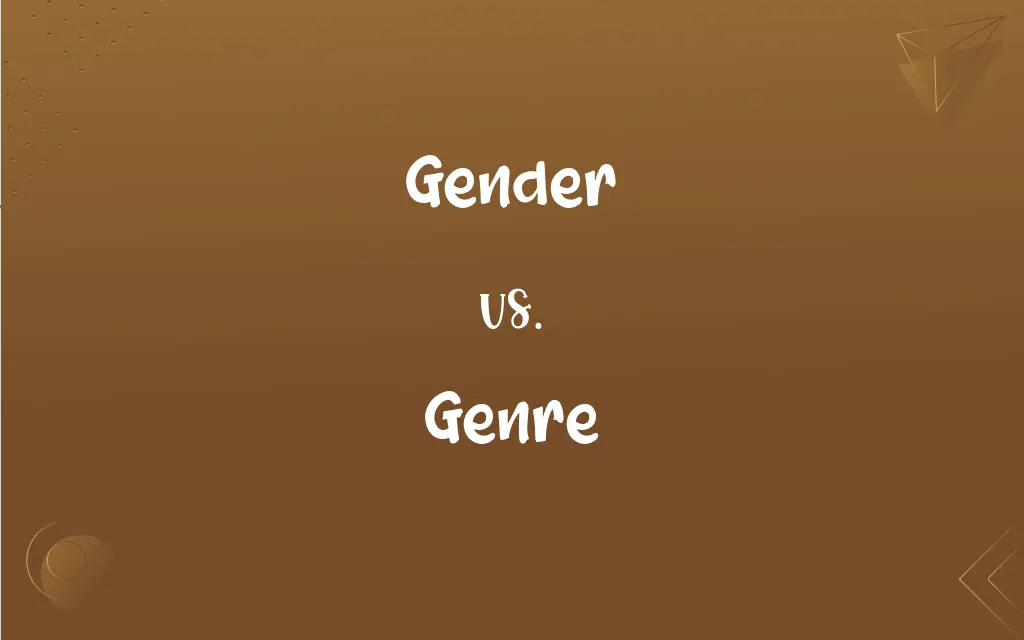Gender vs. Genre: What's the Difference?
Edited by Aimie Carlson || By Janet White || Updated on October 3, 2023
Gender refers to the range of characteristics distinguishing between femininity and masculinity; genre is a category of artistic composition characterized by similarities in form, style, or subject matter.

Key Differences
Gender is a term predominantly used to refer to the socio-cultural distinctions between males and females, reflecting aspects of masculinity and femininity, roles, behaviors, activities, expectations, and attributes society deems appropriate for men and women. Genre, on the other hand, is a classification system used primarily in the arts, including literature, music, and other creative endeavors, to group works with similar themes, styles, structures, or subject matter. While gender is a complex construct that encompasses a spectrum of identities, genre serves to categorize artistic works based on shared characteristics.
Gender serves as a crucial component in understanding social structures, relationships, and identities. It is a multifaceted concept that goes beyond biological differences, encompassing roles, identities, and expressions. Genre, in contrast, is a tool that aids in the organization, analysis, and understanding of artistic compositions. It allows for the identification of patterns and conventions within works and fosters a deeper appreciation and critique of artistic expressions. While gender enriches our comprehension of societal norms and individual identities, genre enhances our grasp of artistic creations and their thematic underpinnings.
In discussions about gender, the focus is often on the societal norms and expectations that define and distinguish masculine and feminine traits, behaviors, and roles. It explores the manifestations and implications of gendered identities and expressions within various societal contexts. Genre discussions revolve around the exploration of stylistic, thematic, and structural elements that define and differentiate categories of artistic works. It aims to elucidate the conventions and innovations present within different genres and subgenres and to understand the artistic intents and impacts.
In understanding human societies and cultures, gender provides insights into the shaping of individual identities, experiences, and relationships within specific cultural and societal frameworks. It examines how gender norms and roles are constructed, perpetuated, and challenged. On the other hand, genre provides a framework for exploring and interpreting artistic expressions, offering insights into cultural, historical, and aesthetic dimensions of works. It facilitates the exploration of creative boundaries, innovations, and traditions within various artistic fields.
From an analytical perspective, both gender and genre offer distinctive lenses through which to understand and interpret varied aspects of human existence and expression. Gender analysis delves into the intersections of gender with other identity categories, exploring its influence on experiences, opportunities, and representations. Genre analysis investigates the dynamics, evolutions, and diversities within artistic compositions, exploring the interplay of tradition and innovation in the crafting and reception of works.
ADVERTISEMENT
Comparison Chart
Definition
Socio-cultural distinctions between males and females.
Category of artistic composition with similar characteristics.
Focus
Roles, behaviors, and identities.
Themes, styles, and structures.
Application
Understanding societal norms and individual identities.
Organizing and analyzing artistic works.
Scope
Broad, encompasses a spectrum of identities.
Specific to arts and creative endeavors.
Discussions
Revolve around societal norms, roles, and identities.
Revolve around stylistic, thematic, and structural elements.z
ADVERTISEMENT
Gender and Genre Definitions
Gender
The behavioral, cultural, or psychological traits associated with one's sex.
Gender stereotypes can limit individual expression and growth.
Genre
A category of artistic works that share similar subject matter, style, or form.
The documentary genre presents factual information about real people and events.
Gender
A classification or category, such as masculine, feminine, or neuter.
The gender of some nouns in Spanish is indicated by the article.
Genre
A category of artistic composition characterized by a particular style, form, or content.
The mystery genre often includes elements of suspense and intrigue.
Gender
A grammatical category, often designated as male, female, or neuter, used in the classification of nouns, pronouns, adjectives, and, in some languages, verbs that may be arbitrary or based on characteristics such as sex or animacy and that determines agreement with or selection of modifiers, referents, or grammatical forms.
Genre
A style of painting or music characterized by a specific form, content, technique.
Abstract is a genre of painting that uses forms, colors, and textures.
Gender
The fact of being classified as belonging to such a category
Agreement in gender, number, and case.
Genre
A type or category of literature or film characterized by a particular form, style, or content.
Science fiction is a genre that explores futuristic or alternative realities.
Gender
Either of the two divisions, designated female and male, by which most organisms are classified on the basis of their reproductive organs and functions; sex.
Genre
A category of artistic composition, as in music or literature, marked by a distinctive style, form, or content
"his six String Quartets ... the most important works in the genre since Beethoven's" (Time).
Gender
One's identity as female or male or as neither entirely female nor entirely male.
Genre
A realistic style of painting that depicts scenes from everyday life.
Gender
Females or males considered as a group
Students lined up with the genders in different lines.
Genre
A type or class
"Emaciated famine victims ... on television focused a new genre of attention on the continent" (Helen Kitchen).
Gender
To engender.
Genre
A kind; a stylistic category or sort, especially of literature or other artworks.
The still life has been a popular genre in painting since the 17th century.
This film is a cross-genre piece, dark and funny at the same time.
The computer game Half-Life redefined the first-person shooter genre.
Gender
(obsolete) Class; kind.
Genre
Kind; genus; class; form; style, esp. in literature.
French drama was lisping or still inarticulate; the great French genre of the fabliau was hardly born.
A particular demand . . . that we shall pay special attention to the matter of genres - that is, to the different forms or categories of literature.
Gender
(grammar) A division of nouns and pronouns (and sometimes of other parts of speech) into masculine or feminine, and sometimes other categories like neuter or common, and animate or inanimate.
Genre
A style of painting, sculpture, or other imitative art, which illustrates everyday life and manners.
Gender
Sex a category, either male or female, into which sexually-reproducing organisms are divided on the basis of their reproductive roles in their species.
The gene is activated in both genders
The effect of the medication is dependent upon age, gender, and other factors.
Genre
A kind of literary or artistic work
Gender
Identification as a man, a woman, or something else, and association with a (social) role or set of behavioral and cultural traits, clothing, etc; a category to which a person belongs on this basis. Compare gender role, gender identity.
Genre
A style of expressing yourself in writing
Gender
Senseid|en|grammar: voice}} (grammar) {{synonym of voice
Genre
An expressive style of music
Gender
(hardware) The quality which distinguishes connectors, which may be male (fitting into another connector) and female (having another connector fit into it), or genderless/androgynous (capable of fitting together with another connector of the same type).
Genre
A class of art (or artistic endeavor) having a characteristic form or technique
Gender
An Indonesian musical instrument resembling a xylophone, used in gamelan music.
Genre
A kind or sort of literary or artistic work characterized by a particular characteristic.
The romance genre typically centers around the theme of love.
Gender
(sociology) To assign a gender to (a person); to perceive as having a gender; to address using terms (pronouns, nouns, adjectives...) that express a certain gender.
Gender
(sociology) To perceive (a thing) as having characteristics associated with a certain gender, or as having been authored by someone of a certain gender.
Gender
(archaic) To engender.
Gender
To breed.
Gender
Evoking indescribable feelings regarding gender.
This song is so gender.
Gender
Kind; sort.
Gender
Sex, male or female.
Gender
A classification of nouns, primarily according to sex; and secondarily according to some fancied or imputed quality associated with sex.
Gender is a grammatical distinction and applies to words only. Sex is natural distinction and applies to living objects.
Gender
To beget; to engender.
Gender
To copulate; to breed.
Gender
A grammatical category in inflected languages governing the agreement between nouns and pronouns and adjectives; in some languages it is quite arbitrary but in Indo-European languages it is usually based on sex or animateness
Gender
The properties that distinguish organisms on the basis of their reproductive roles;
She didn't want to know the sex of the foetus
Gender
The state of being male or female.
The survey included questions about gender, age, and income.
Gender
A range of characteristics distinguishing between masculinity and femininity.
Discussions about gender roles are becoming more prevalent in modern society.
Gender
A person's self-representation as male or female, or how that person is responded to by social institutions.
The new policy promotes gender equality and inclusivity.
FAQs
Can a genre have subgenres?
Yes, genres often have subgenres with more specific characteristics and themes within the broader category.
Can genre include different forms of art?
Yes, genre can categorize literature, music, film, painting, and other artistic expressions based on similarities.
Is gender strictly binary?
No, gender is a spectrum and includes diverse identities beyond the binary classification of male and female.
How is gender identity different from biological sex?
Gender identity is an individual’s internal sense of their gender, whereas biological sex is determined by physical and genetic characteristics.
Are gender and genre related?
No, gender refers to socio-cultural distinctions related to being male or female, while genre refers to categories of artistic works.
Is genre fixed or can it evolve?
Genre is not fixed; it can evolve and new genres can emerge over time with changes in artistic expressions and cultural contexts.
Can gender roles change over time?
Absolutely, gender roles are socially constructed and can evolve or change based on societal shifts and cultural changes.
Are genres universally agreed upon?
While some genres are widely recognized, there can be debates and differing opinions on genre classifications and definitions.
Does genre impact the reception of a work?
Absolutely, genre shapes expectations and interpretations and can significantly impact how a work is received by audiences.
Does every culture have gender norms and roles?
Yes, every culture has some form of gender norms and roles, but they vary widely in definitions, expectations, and expressions.
Can an individual’s gender change over time?
Yes, an individual’s understanding and expression of their gender can evolve, and some people may undergo gender transitions.
Can a work belong to multiple genres?
Yes, a work can exhibit characteristics of multiple genres and thus be categorized under multiple genres.
Is the concept of gender universal?
While the concept of gender exists universally, the definitions, roles, and perceptions of gender vary significantly across different cultures.
How does genre influence a work of art?
Genre influences the themes, structure, style, and content of a work, guiding both the creation and the interpretation of the work.
Is understanding gender important for societal development?
Absolutely, understanding gender is crucial for addressing inequalities, fostering inclusivity, and promoting social harmony and development.
About Author
Written by
Janet WhiteJanet White has been an esteemed writer and blogger for Difference Wiki. Holding a Master's degree in Science and Medical Journalism from the prestigious Boston University, she has consistently demonstrated her expertise and passion for her field. When she's not immersed in her work, Janet relishes her time exercising, delving into a good book, and cherishing moments with friends and family.
Edited by
Aimie CarlsonAimie Carlson, holding a master's degree in English literature, is a fervent English language enthusiast. She lends her writing talents to Difference Wiki, a prominent website that specializes in comparisons, offering readers insightful analyses that both captivate and inform.































































